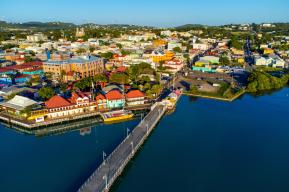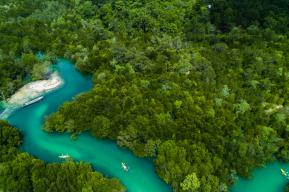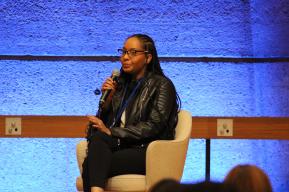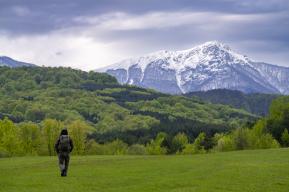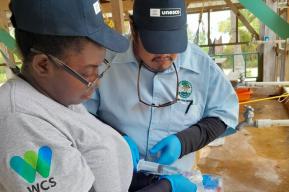News
Seychellois school children collect eDNA samples during ‘Trip of a Lifetime’ to Aldabra Atoll

From 31st March to 4th April 2023, four teachers and eleven students aged 11 to 17 visited the Aldabra Atoll World Heritage site as part of the yearly Eco-School programme run by the Ministry of Education, and sponsored by the Seychelles Islands Foundation. During their ‘Trip of a Lifetime’, the children collected water samples with the guidance of scientists from the Aldabra research station. The children also counted turtle tracks with rangers, spotted endemic fauna in the wild, identified mangrove plants, and cleaned up marine debris from the beach.
The group collected water samples at 5 different locations across the Aldabra Atoll World Heritage site and filtered genetic material of species with the help of eDNA citizen-science sampling protocols and equipment provided by UNESCO. Preservation liquid was subsequently added to the samples to fix the eDNA and make them ready to ship to a specialized lab for analysis, alongside other eDNA samples from around the world.
The application of ground-breaking technology in the Seychelles, involving local schoolkids, is an amazing opportunity that will show them the importance and potential of technology and science in protecting our natural heritage for the future.
Environmental DNA is an innovative scientific method that can be used to monitor and evaluate ocean biodiversity without the need to extract organisms from their environment. Just one liter of water may contain genetic material from hundreds of species and may help determine the area’s biodiversity richness.
The UNESCO environmental DNA Expedition initiative is being rolled out across 25 marine World Heritage sites between September 2022 and April 2023. The eDNA data is expected to provide a one-off snapshot of biodiversity richness across marine World Heritage sites, particularly for fish species.
By combining the resulting biodiversity data with Intergovernmental Panel on Climate Change (IPCC) heat scenario projections, the initiative aims to provide a first glimpse of potential geographic and distribution shifts of fish species as a result of climate change which then in turn can inform conservation decision-making.
The eDNA Expeditions’ resulting data will be made publicly available through the UNESCO Ocean Biodiversity Information System, the world’s largest open science marine species database. Final results are expected to be available in Spring 2024.
The UNESCO eDNA initiative is a joint collaboration between the Intergovernmental Oceanographic Commission and the World Heritage Centre. It is made possible with the support of the Government of Flanders (Kingdom of Belgium) and implemented in the context of the United Nations Decade of Ocean Science for Sustainable Development (2021-2030).
About the Aldabra Atoll World Heritage Site (Seychelles)
Located in the Indian Ocean, the remote and inaccessible Aldabra Atoll has remained largely untouched by humans for the majority of its existence. The atoll was inscribed on the UNESCO World Heritage List in 1982 and hosts globally important breeding populations of endangered green turtles, the second largest frigatebird colony in the world, and one of the world's only two oceanic flamingo populations. The pristine fringing reef system and coral habitat are in excellent health and distinguished by their intactness and the sheer abundance and size of species contained within them.
About the Seychelles Islands Foundation
The Seychelles Islands Foundation (SIF) manages and protects Seychelles’ UNESCO World Heritage Sites: Aldabra Atoll in the far south of the archipelago, Vallée de Mai on Praslin Island, as well as the Fond Ferdinand nature reserve. SIF has been a pioneer in nature conservation as the longest running environmental organization in the Seychelles. Established as a public trust in 1979, SIF has successfully managed both World Heritage sites for over 30 years, made substantial contributions towards biodiversity conservation, and established international and national links and collaborations, bringing benefits to global and national conservation objectives.



